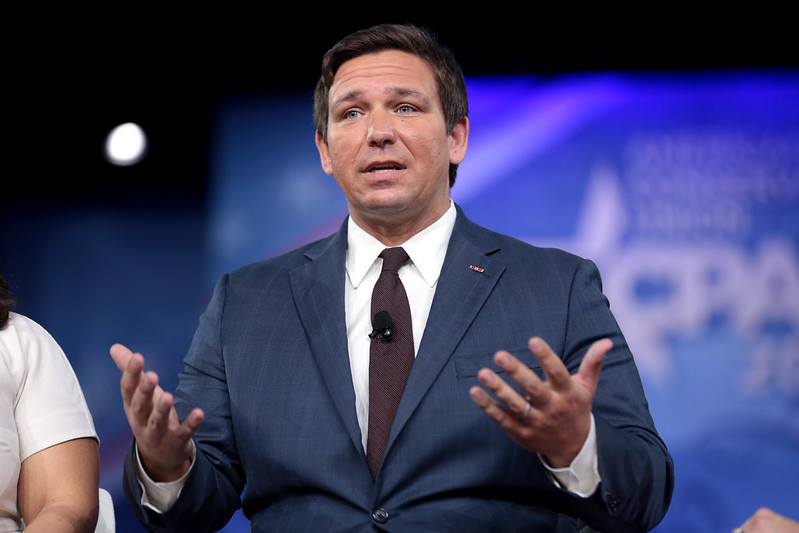In his ruling, U.S. District Judge Mark Walker effectively discarded the group’s free speech lawsuits by striking DeSantis and other administration officials as defendants. However, Walker did reserve some criticism for Florida’s controversial governor, suggesting that the students’ alleged “anxiety” was understandable in light of DeSantis’s comments.
A federal judge has dismissed First Amendment lawsuits filed by pro-Palestine university students against Florida Gov. Ron DeSantis, who they claim attempted to suppress their rights to free speech by ordering colleges to restrict certain organizations after Hamas-led attacks on Israeli civilians in October of 2023.
The lawsuit was filed on behalf of Students for Justice in Palestine at the University of South Florida this past November. In it, attorneys for the organization alleged that Gov. Ron DeSantis and the state Board of Governors had unconstitutionally attempted to disband and deactivate collegiate chapters affiliated with the pro-Palestine movement.
According to The Hill, U.S. District Judge Mark Walker denied the students’ request for a preliminary injunction, ruling that a memo sent by DeSantis administration officials to in-state universities has not been enforced.
Walker also noted that “the record demonstrates neither deactivation nor criminal investigation [of pro-Palestine student groups] is imminent.”
Aside from an apparent lack of enforcement, Walker observed that the Florida Board of Governors—the body regulating the state’s public university system—had “incorrectly described” pro-Palestine chapters as affiliated with the National Students for Justice league in Palestine, making it unclear “whether the memorandum even continues to apply to Plaintiff.”

“The Court finds that no actions have been taken in pursuit of deactivation under the Chancellor’s memorandum,” Walker wrote. “And, as this Court has already found, the Defendants with legal authority to directly regulate registered student organizations do not intend to deactivate Plaintiff.”
“Plaintiff has proffered no record evidence demonstrating that the University of South Florida has taken any action based on the Chancellor’s statements on November 9th,” Walker said, adding that there is no evidence to suggest that the students’ speech had been “chilled” or that their reputations were ever harmed.
In support of this point, Walker noted that the University of South Florida chapter of Students for Justice in Palestine continue to meet and protest.
“This court’s finding is based on the fact that nobody introduced any evidence of additional actions the university took in furtherance of the memorandum before plaintiff filed its complaint,” he said.
“Ultimately, the evidence before this court demonstrates that ‘deactivation’ remains simply an amorphous threat contingent upon either the BOT (university board of trustees) reevaluating its aversion to possibly incurring personal liability or the BOG (board of governors) taking some action to pass a new regulation to take back its delegation of authority over student organizations. Absent any evidence to suggest either of these future contingencies are imminent, the asserted injury of threatened deactivation remains merely speculative,” Walker found.
Walker also addressed earlier allegations that the memo, originally released in October, had left students feeling “scared,” “disheartened,” and “disappointed.”
“But evidence of subjective fear or anxiety, on its own, does not give rise to a cognizable constitutional injury,” Walker said, writing that students could not even convincingly demonstrate they felt any need to self-censor their speech.
Despite the dismissal, an attorney for the plaintiffs cast the outcome as a victory.
“Florida officials are now on notice that if they attempt to enforce the deactivation order, we will be back in court to uphold our client’s First Amendment rights,” said American Civil Liberties Union attorney Brain Hauss. “The chancellor should formally acknowledge that the deactivation order will not be enforced by removing it from his official website.”
The Hill notes that, although the court found that neither DeSantis nor the state university system could be held liable for speculative damages, Walker made no effort to mince words in criticizing the governor’s words and actions.
“This Court does not fault Plaintiff’s members for feeling anxious about the fact that the Governor—arguably the most powerful man in Florida—has repeatedly disparaged Plaintiff’s members as ‘terrorists’ who support ‘jihad’ and repeated the falsehood that their organization has been ‘deactivated,’” Walker wrote.
“But this Court rejects counsel’s suggestion that it should find, in the absence of other evidence, that Plaintiff has standing simply because someone cloaked with great power makes coercive statements that cause college students to fear some hypothetical future harm,” he said. “Plaintiff’s arguments stretches the injury-in-fact requirement beyond the boundaries that case law has established for standing in First Amendment pre-enforcement challenges,” he wrote. “This Court is not free to exceed those boundaries.”
Sources
Judge delivers major blow to free speech lawsuits brought by pro-Palestinian groups against DeSantis
Judge dismisses Florida pro-Palestinian student groups’ free speech lawsuits against DeSantis
Judge: Florida official overstepped authority in DeSantis effort to stop pro-Palestinian group


Join the conversation!